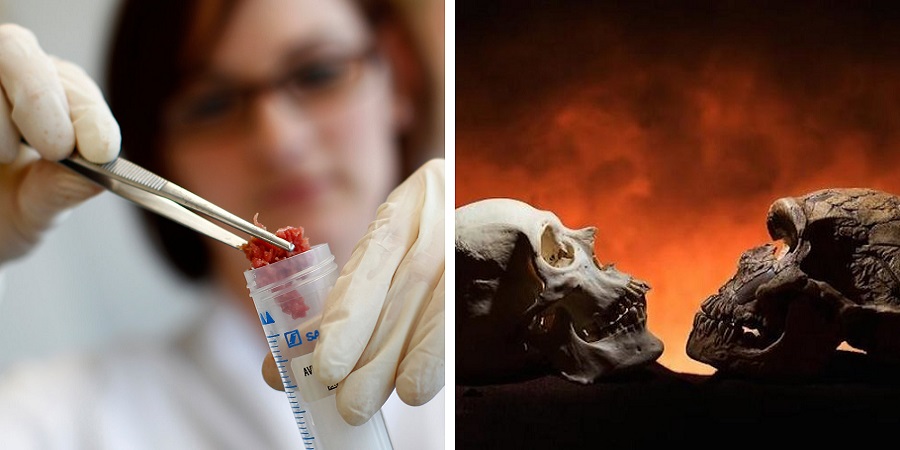Does Eating Human Meat Change Your DNA

I’ve been curious about the effects of consuming different types of meat, including the unthinkable – human flesh. Yes, you read that right.
As a vegetarian, the thought of consuming another human being’s meat is abhorrent to me; I’ve always believed in cruelty-free and healthy plant-based nutrition.
However, I understand that cannibalism has been a part of human culture for thousands of years, with various cultural, ritual, and survivalist reasons behind it.
But what are the actual implications of eating human meat? Does eating human meat Change our DNA? Are there any side effects? Join me as we explore the science behind this taboo practice.
Cannibalism is not a new phenomenon. It has been practiced by various human ancestors and has been a part of human history for centuries. In some cultures, cannibalism was believed to transfer the strength or attributes of the consumed individual to the consumer. Ritualistic cannibalism was also practiced as a way to honor the deceased or as part of religious ceremonies.
Even in Europe, the consumption of human body parts was once believed to have medicinal properties.
In desperate times, such as during famines or sieges, people have resorted to cannibalism as a means of survival. Reports of cannibalism during events like the North Korean famine in 2013, the siege of Leningrad in the 1940s, and China’s “Great Leap Forward” in the 1950s and 1960s highlight the extreme circumstances under which cannibalism may occur. Before we delve into the health implications, it’s important to address the moral and ethical aspects of cannibalism. Our initial reaction to the idea of consuming human flesh is often one of disgust and revulsion. However, it’s essential to recognize that cultural practices and beliefs shape our perceptions. In some cultures, consuming parts of deceased loved ones is seen as a way to honor and remember them, a deeply personal and meaningful ritual. While these practices may seem disturbing to us, it’s essential to acknowledge the diversity of human experiences and beliefs.
I talked about belief. Let’s look a little deeper:
In some cultures, eating dog and cat meat is considered acceptable, while for others, it is a taboo subject. Similarly, many cultures consume beef or newborn calves and lambs without hesitation, believing that these animals were created for human consumption. Beliefs surrounding food and dietary choices vary greatly among different societies and individuals.
So, It is very natural that some groups believe in cannibalism. Cannibalism has also made its way into popular culture, further fueling our fascination and repulsion with the topic. From horror movies like “The Silence of the Lambs” to novels like “Cannibalism: A Perfectly Natural History” by Bill Schutt, our obsession with cannibalism persists.
While the moral and ethical implications of cannibalism are clear, what about its potential impact on human health? In most societies, cannibalism is considered a last resort, only practiced when there are no other options for survival. However, the act of consuming human flesh can have severe health consequences.
Prions are abnormal proteins that can cause devastating diseases, such as kuru, Creutzfeldt-Jakob disease (CJD), and variant CJD (vCJD). These diseases lead to severe neurological degeneration and, in some cases, death. Prions are unique because they replicate by forcing other proteins to adopt their abnormal shape, leading to the formation of amyloid plaques in the brain. When we talk about the side effects of cannibalism, we must focus on the health risks associated with prion diseases. The symptoms of prion diseases can vary but often include neurological deterioration, cognitive decline, and, ultimately, death. The transmission of prions through cannibalism can lead to devastating consequences for individuals and communities.
The transmission of prion diseases, including those associated with cannibalism, can occur through various routes.
For Example:
Consuming the brain of another human being can result in a prion disease called kuru, which is similar to mad cow disease. Symptoms of kuru include trembling and eventually death.
As I said, The Fore people in Papua New Guinea were known for practicing cannibalism, specifically consuming the bodies of relatives to cleanse their spirits. This practice led to a significant number of Fore individuals contracting kuru. However, over time, some members of the Fore population developed a genetic mutation that protected them from the prions responsible for transmitting kuru, making them less susceptible to the prions that cause Kuru. This mutation, known as the V127 allele, provides a level of resistance to the disease.
The Fore people who carried the V127 allele were more likely to survive and reproduce, passing on this genetic advantage to future generations. It is important to note, however, that genetic mutations and adaptations are not a guarantee of immunity, and the risks associated with cannibalism still remain.
برای نمایش آواتار خود در این وبلاگ در سایت Gravatar.com ثبت نام کنید. (راهنما)






















































ایمیل شما بعد از ثبت نمایش داده نخواهد شد